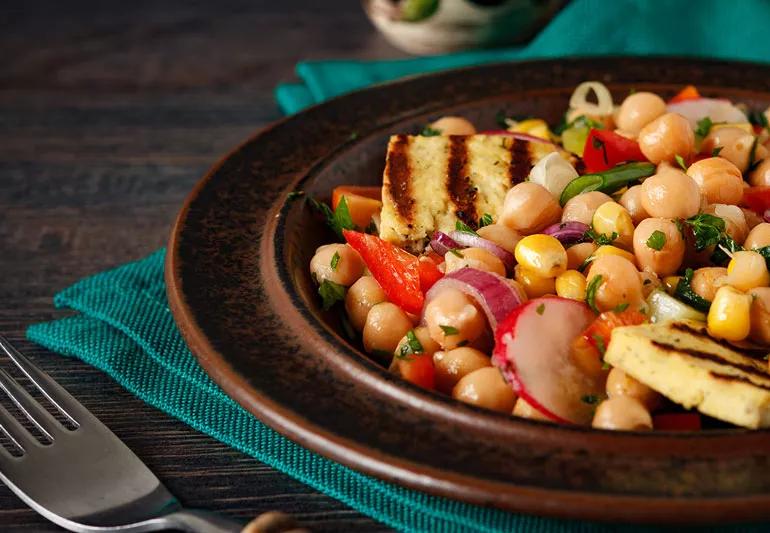Here’s how faux meat products stack up

Image content: This image is available to view online.
View image online (https://assets.clevelandclinic.org/transform/0ef2474d-945b-4535-b682-14bee7efae5e/meatSubstitutesTofuBeans-516425154-770x533-1_jpg)
some meat substitutes are tofu and beans
Veggie burgers aren’t just for vegetarians anymore.
Advertisement
Cleveland Clinic is a non-profit academic medical center. Advertising on our site helps support our mission. We do not endorse non-Cleveland Clinic products or services. Policy
Cruise down the refrigerated and frozen aisles of the grocery store and you’ll see all kinds of packaged meat alternatives, from standard bean-based veggie burgers to “chicken” nuggets to vegan bacon.
There’s also a new generation of faux meat products that are highly processed to mimic the look, flavor and texture of the real thing (some even “bleed” like a burger or piece of steak would).
For anyone who’s looking to pare back their meat consumption, these products can help ease the transition. But just because a product is vegetarian or vegan doesn’t necessarily mean you should think of it as health food that belongs on your plate every day, says registered dietitian Camille Skoda, RDN, LD.
Here’s her advice for picking the best meat substitutes.
While good-quality meat can provide your body with a plethora of different vitamins, minerals and nutrients, plant-based proteins have their own unique set of benefits, Skoda says.
“Having one meatless meal per day, or one meatless day in a weekly, can help you to diversify your diet, add fiber, and include other sources of protein,” she says.
Whole-food sources of plant protein, such as beans, lentils, nuts, seeds and whole soy, provide fiber and prebiotics to help your gut stay health. They also contain sustainable carbohydrates and healthy fats that can help balance blood sugars, Skoda adds.
Studies have also linked plant-based diets with lower risk of cardiovascular disease and other health benefits.
Advertisement
While many packaged meat substitutes are made with healthy, whole-food plant proteins and ingredients, not all of them are. That’s why it’s important to flip over the box and see what’s in one before you buy it.
“Some of these products have added preservatives, sugars, inflammatory oils or other ingredients that we don’t want,” Skoda says.
Before snatching up that meatless chorizo, she recommends considering your personal dietary needs and looking at:
Packaged plant-based products that imitate beef, chicken and pork may be a convenient 1:1 substitute at your next cookout, but there are plenty of other plant proteins that can be easily incorporated into your everyday diet.
Consider swapping out the meat in a recipe for:
Whether you’ve recently cut out meat from your diet or are just trying to eat less of it, plant-based proteins can help fill the void.
Advertisement
Advertisement

Delivered every Tuesday!
Sign up for our Health Essentials emails for expert guidance on nutrition, fitness, sleep, skin care and more
It's a letter about the news!

Every two weeks once
Sign up for our Health Essentials emails for expert guidance on nutrition, fitness, sleep, skin care and more.
Learn more about our editorial process.
Advertisement
This edible insect powder can be a good source of protein, fiber and other nutrients
Some options like chicken breast and beans are better for you than processed meats or dairy
Protect and build muscle while getting essential amino acids and calcium with this protein
Going overboard on protein can lead to weight gain and kidney damage, among other issues
It’s nutritious, offers fiber, antioxidants and protein, and is good for food sensitivities
Complete proteins contain all of your essential amino acids
An expert explains the type of pea proteins and the benefits
The short answer from a dietitian about mixing protein powder and coffee
Type 2 diabetes isn’t inevitable with these dietary changes
Applying a hot or cold compress can help with pain
Pump up your iron intake with foods like tuna, tofu and turkey